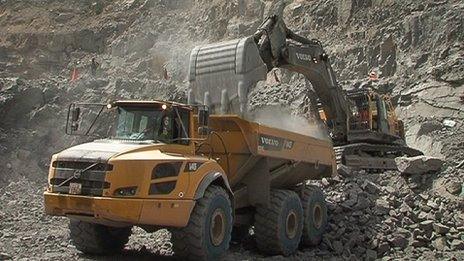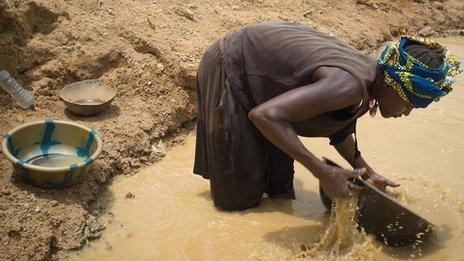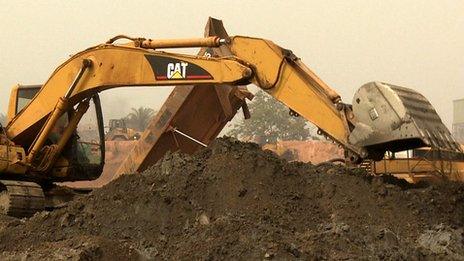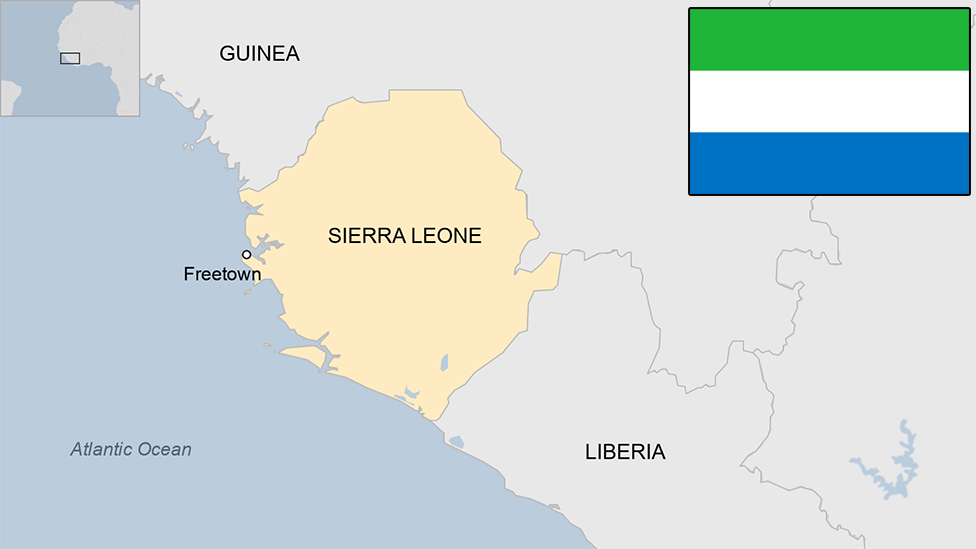Sierra Leone 'blood diamonds' not forever
- Published

Some of Koidu's diamond mines are now mechanised
The west African state of Sierra Leone has taken another symbolic step away from its wartime image as the home of the "blood diamond". An Israeli-owned company has started operating a big new stone-crushing plant at a modern diamond mine in the east of the country.
It is the area where the rebel war in Sierra Leone began in 1991 and - not coincidentally - the place where most of the country's diamonds are found.
The contrast between the modern new plant, based in the town of Koidu, and traditional hand-dug alluvial mining could not be more stark.
The plant is part of a wave of foreign investments in mining, roads and buildings that have transformed the face of Sierra Leone in the past few years.
New start
The Mayor of Koidu, Sahr Musa Sessie-Gbenda, said: "Before the war this was a major trading centre because it's near the borders of Guinea and Liberia.
"Then during the hostilities the economy took a nose dive. Now, people are trying to rebuild again."
Koidu is still a very poor place by international standards.
I didn't see a single properly tarmacked road in the town and most people here have to get by without running water or mains electricity.
But the markets are buzzing with activity and bulldozers are beginning to dig storm drains along major routes and grade some of the tracks.
The owner of the newly refurbished mine that trades under the name Koidu Holdings, is an Israeli billionaire, Beny Steinmetz.
By chance he was in Koidu when I visited and although he said he never gave broadcast interviews, I managed to persuade him to say a few words.
He did not say much - billionaires, I suppose, do not have to.
"This is the future," he said. "It means work for the people and income for the country".
Bloody past
When I visited Koidu in the late 1990s it was a moonscape of small pits dug by civilians but largely controlled by armed rebels who stood over them to "tax" any gemstones they found.
The thirst for diamonds, called "blood diamonds" because many were used to buy rebel guns, was so intense back then that people were digging up the foundations of houses in search of gems.
At the time, I did not understand why the footings of houses were so attractive to the diggers.
But an engineer at the new mine explained the phenomenon to me on my return visit this year.
"In the 1970s and 80s people built the foundations of their houses here using gravel waste from a long abandoned diamond mine," the engineer said.
"Over the years the demand for diamonds increased, so what was waste a long time ago could be exploited again, especially because the rebels had slave labour to do the work for them."
"That's why, when you came here in the late 1990s," the engineer told me, "you saw people digging up their living rooms!"

Some people still have have no choice but to pan for diamonds by hand
Today there are still thousands of people living off traditional hand-dug mines in the Koidu area.
Digging and panning for diamonds by hand is backbreaking work, but for many people it is the only work available.
Investment boom
The new plant that runs 24 hours a day only employs a small percentage of the people in the area who would like jobs there.
Sierra Leone's foreign investment boom, mainly in iron ore and diamond mines but also in roads and new homes, has created small islands of prosperity and the possibility of increased tax revenues for the state.
But the majority of Sierra Leoneans are still extremely poor and it is still an open question how much of this new investment money will, in the development economists' phrase, "trickle down" to ordinary people.
The vast majority of Serra Leoneans make a living out of agriculture.
A cocoa trader in Koidu, Job Koademba, said small scale investments in farms were essential if more people were to be brought out of poverty.
"Lots of people have land," Mr Koademba said, "but having land without money to invest in it - to buy seeds and tools - is like having a car without any fuel in it. It's no use."
Mr Koademba is undoubtedly right.
But it is also true that in the past decade or so Koidu has changed beyond all recognition.
Where there were rebels with guns, there are now police officers. Where there were hungry, displaced people, there are now lively market traders.
A bad image or reputation sticks like glue - especially in Africa.
So it is worth saying again.
There are no more "blood diamonds" in Sierra Leone.
- Published27 February 2012

- Published27 November 2023
